TLDR: I believe that a lot of (the best) avant-garde mangas like ultra heaven, are not being considered as avant-garde on websites like myanimelist, and this may be a problem, you can go post now about general avant garde shit, no need to read the rest of my ramblings
The rest of the post
Avant garde, as defined by the oxford dictionary:
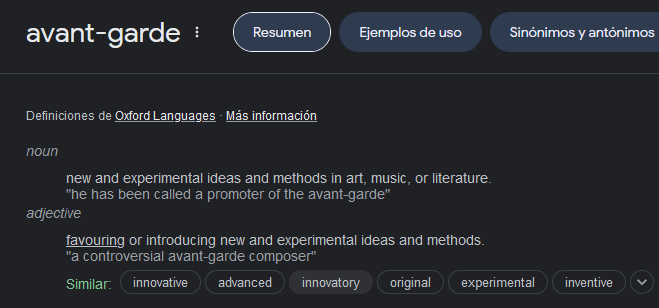
This term refeers to mainly experimental works, so, fair, let's go to myanimelist, let's go see some examples of this

only 71 results? why?, and all the ratings are actually quite low too, the best rated one only being a 7.6, the lowest out of any category in myanimelist
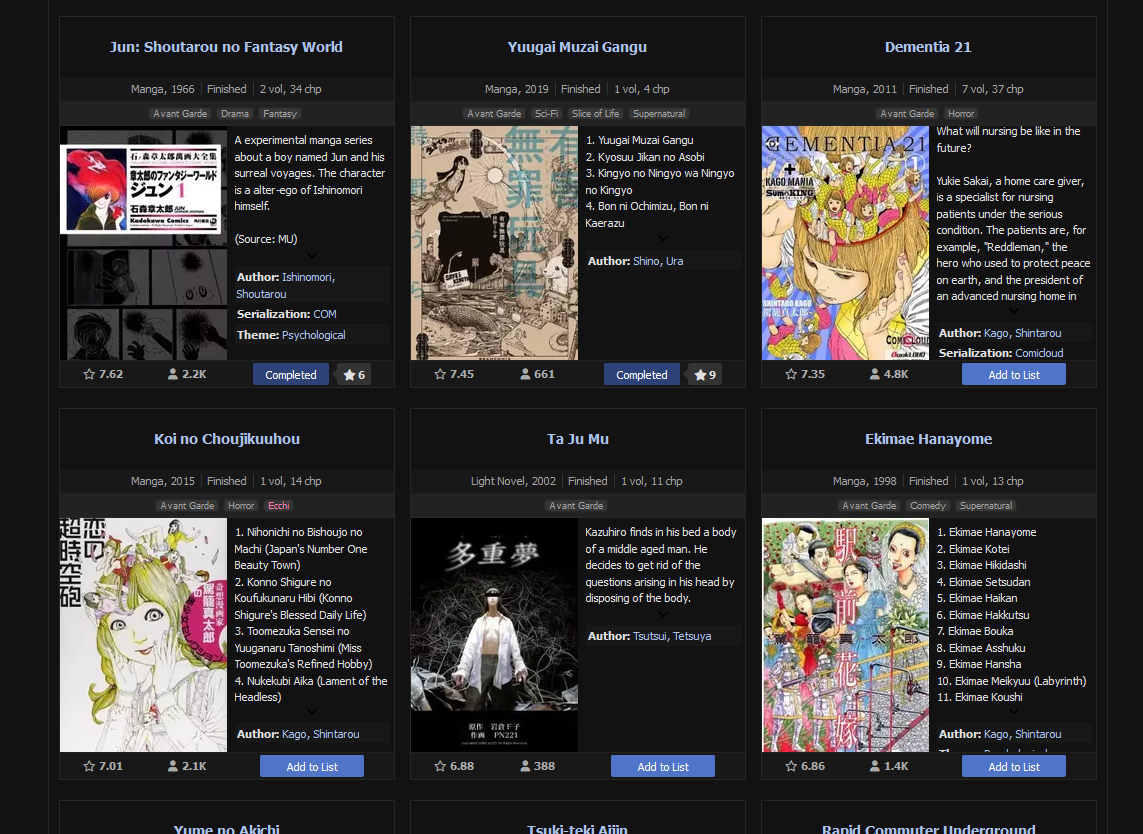
are these the only avant garde works that there are? is this really it?
I don't think so: Let me explain
Avant garde as I explained earlier, is a term meant to differentiate very experimental works, in this case, experimental mangas/animes, however, what counts as experimental is subjective, it depends on what you have experienced so far, and how far and innovative the thing you're reading is
not only that, but the historical period when the work was created also matters a lot in order to qualify things into this category, I think the highest rated avant-garde manga on myanimelist does a very good job at explaining this, so, let me analyze it, in order to find out what counts as avant garde
-----
Part 1: Jun: Shoutarou no Fantasy World
Jun is a manga created in 1966, that could be considered an anthology, each chapter contains different characters, in different situations, with stories inclosed to those chapters.
What's so interesting about this manga, is the panel structure, in a era when most of the mangas feel very stiff with it's structure, where mangakas aren't really decorating the pages or reusing panels, you have jun, where it tears this concept to the ground, I feel chapter 5 is a very good example of this
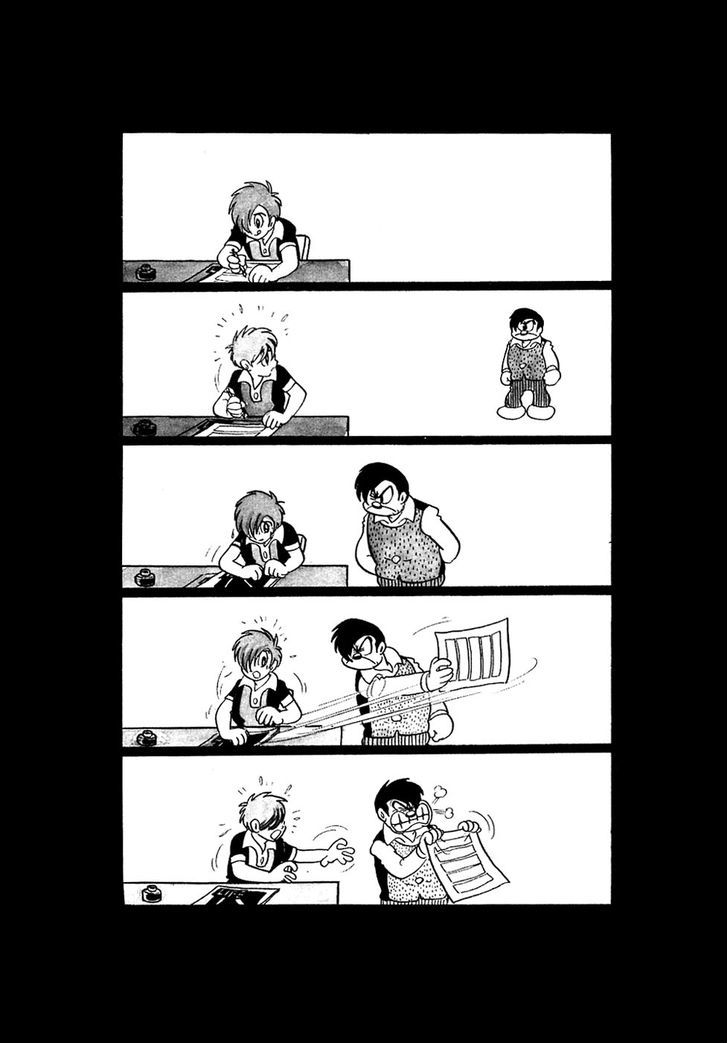
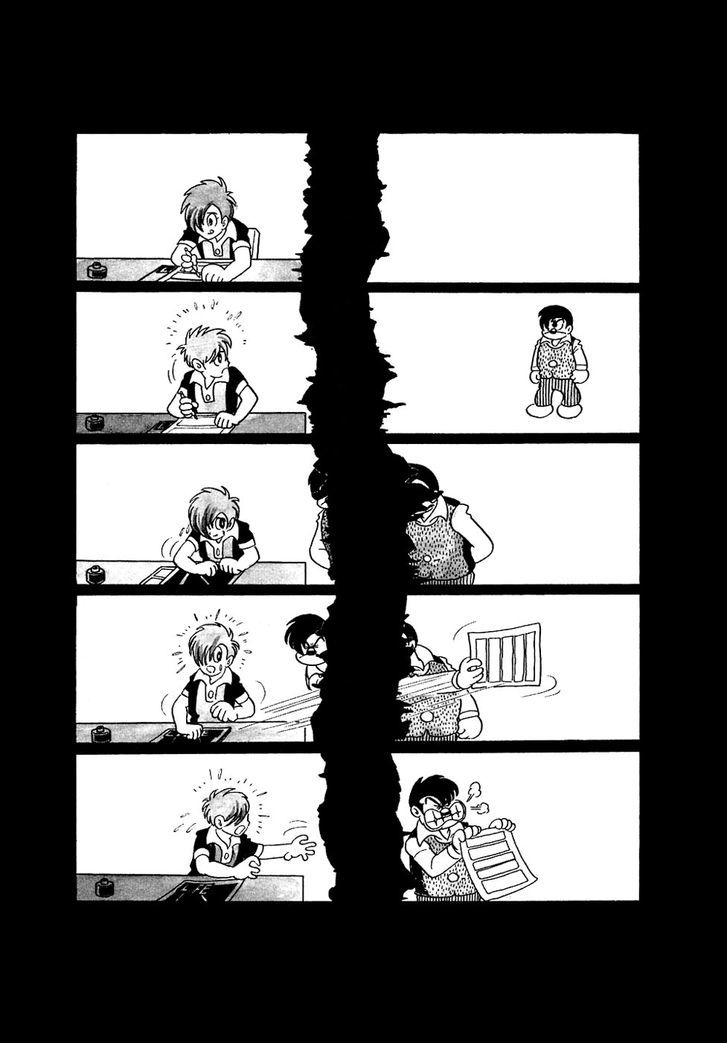
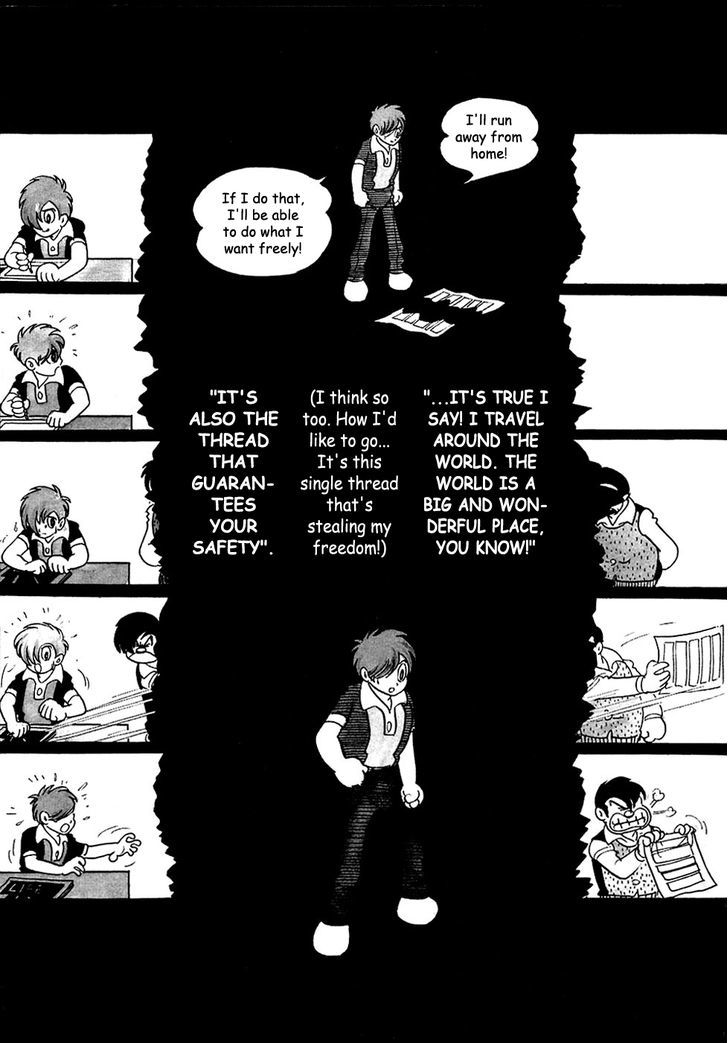
most mangas wouldn't have dared to do this, have a initial scene, where something happens, and then that action affects the way the page is designed, to then create dialogue in a way that you cant really distinguish any specific panel, this was unseen, this was a crazy development
not only that, but in following chapters, a lot more techniques were showcased, chapters with no dialogue, abstract imaginery and storytelling, unorthodox panel shapes, it has it all
however, if you read all of that description, and thought "I've already seen all of this before", you would likely be right. This manga was written in 1966, and many of these elements have been implemented into works that are not considered avant-garde, a lot of mangas, do stuff outside the panel realm now, here is an example from Witch Hat Atelier
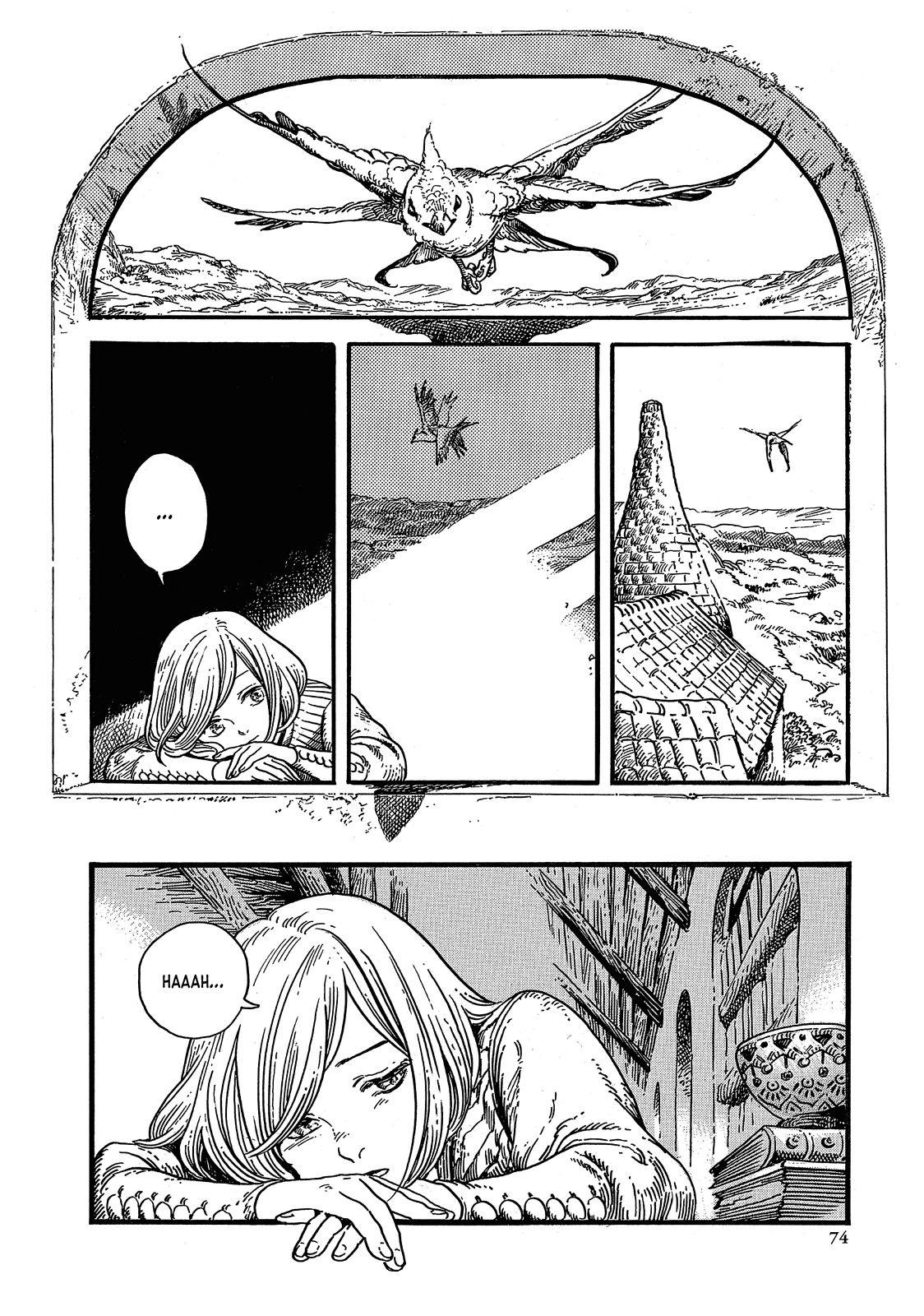
that element, once considered avant-garde, is now being used commonly on modern mangas
okay, so we've stablished what an old, avant-garde manga looks like, let's now analyze a modern avant-garde manga, and one of my favourites,
----------
Part 2: Yuugai Muzai Gangu
This manga was written in 2019, and while it's still an anthology, it's very different to the last. Here, the avant garde elements are mainly in plot since it showcases ideas that you've probably never read in any manga before, the first chapter is a great example of this
In this chapter, there are a couple of weird inventions being showcased, one of them is a doll that looks like whatever the person will find the most appealing
here is that invention in action
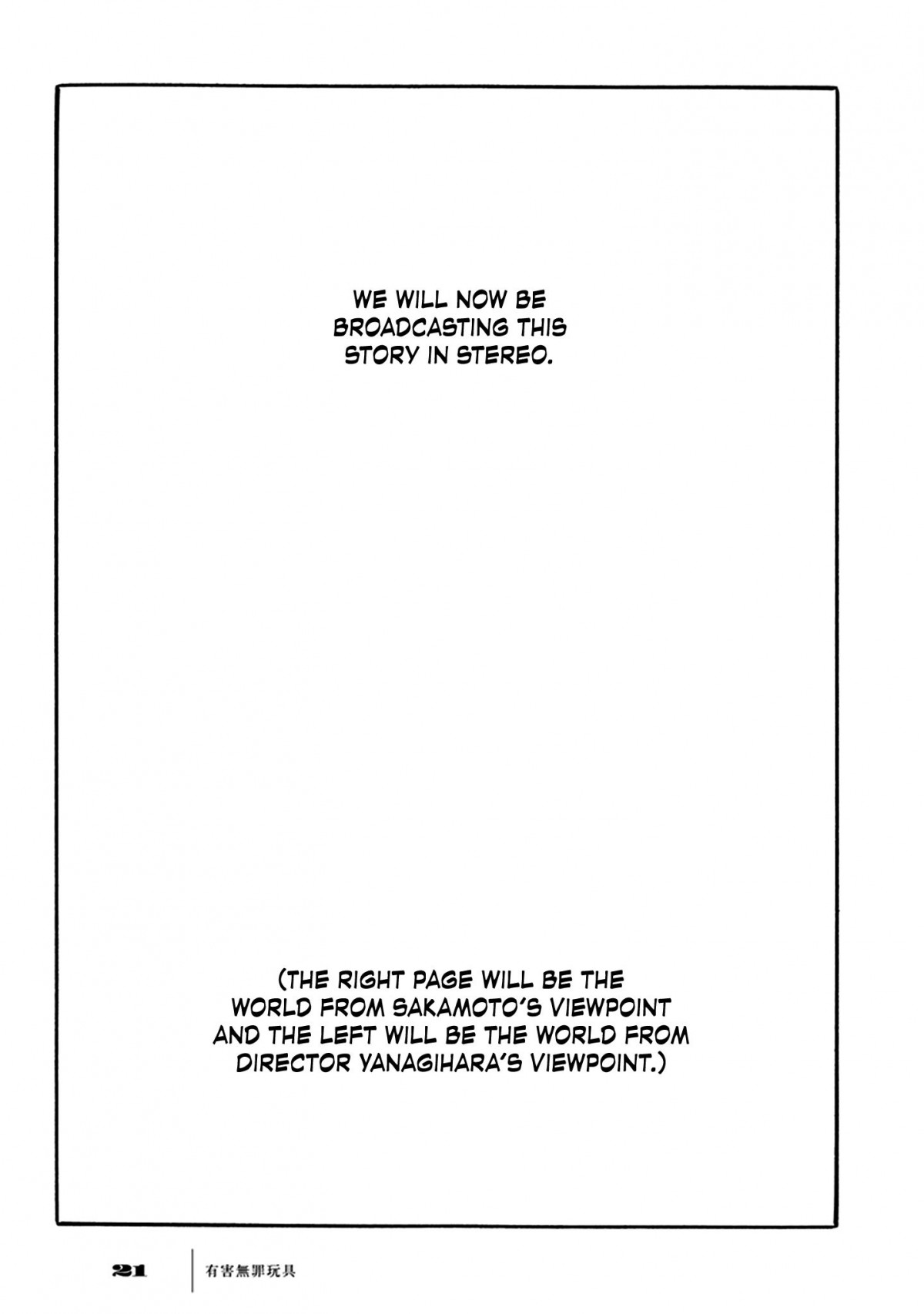
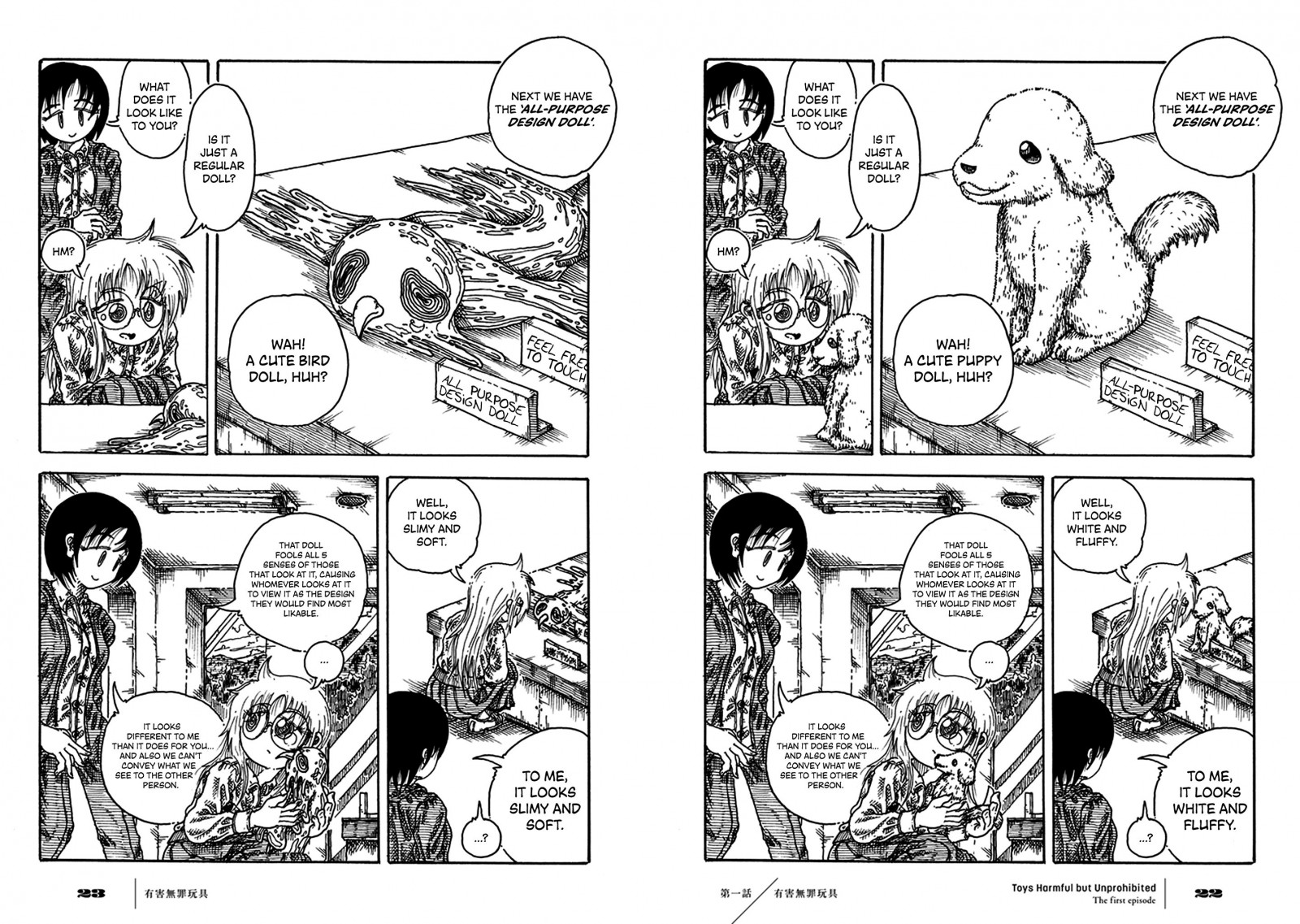
this is the most bizarre element of the manga so far, the most shocking, however, there are many other plots thrown around in the many chapters, all of them could be a whole manga long, and there are in fact mangas that feel like this, so, let's see one of them
--------
Part 3: If you didn't expect me to talk more about shimeji simulation, you dont know me well enough
This is my favourite manga of all time, in fact, my favourite work of all time, be it videogames, mangas, movies, books, etc
Shimeji has it all, the plot feels like a chapter of the previous manga, while it has a panel structure which at times is crazier than in juns
a lot of the plot questions a lot of philosophy and other psychological works, in fact, from time to time it does mention a lot of the books it refereces out loud, works like no longer human, zaratrusta or even the bible
i'm not going to go too in depth, I already made a thread about shimeji, this is the most apparent during chapter 44, were, the manga straight ups ditchs drawing, and turns into a novel for a little while, not only that, but the plot and worldbuilding supports this change (dont actually read the text as it contains spoilers but yeah, it's like that)
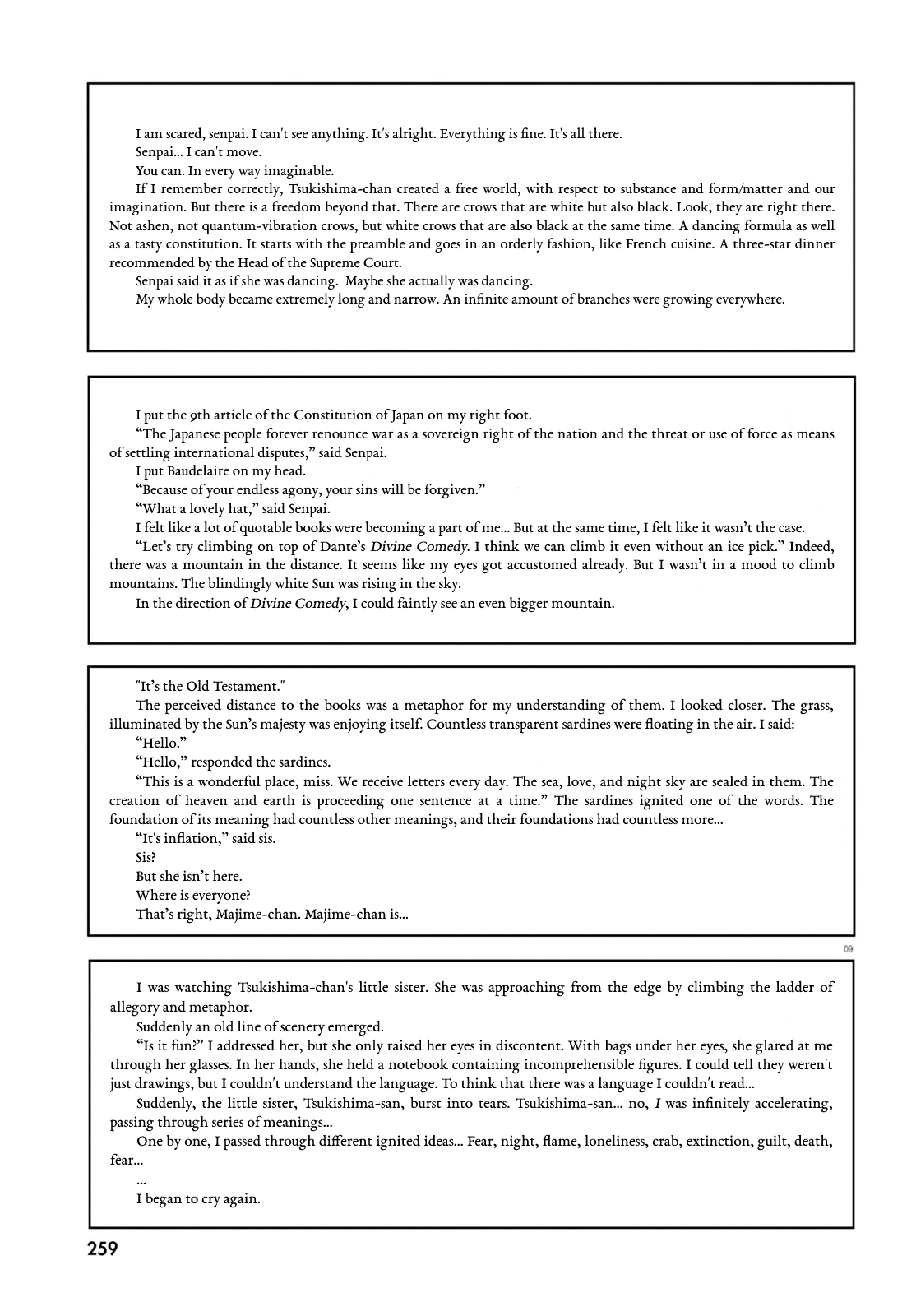
the entire later half of shimeji is like that, it throws so many concepts, so many ideas, and so extreme too, like ditching drawing, that has to be the most extreme case i've ever seen of breaking a manga structure, no manga i've read contains anything like that, this is experimental, this is original, this is clearly avant-garde
but if you look in myanimelist, this is not considered avant-garde, and my theory on it, is that this is because it's not an anthology
if you look at all the mangas considered avant-garde, most of them, except with a few exceptions are anthologies, not only that, but a lot of the tropes, like textless chapters, repeat, however, a non-anthology manga like shimeji simulation, with a innovative idea that's the reverse of that avant-garde trope, is not considered one
something that takes the avant garde, and makes it even mroe avant garde, is not avant garde, and I have another work, that is very clearly avant-garde, that is not an anthology, that is not considered avant garde
----------
Part 4: Ultra heaven
Ultra heaven is the purest for of avant garde, as the manga is literally based on the experiences they had with LSD. The story is from time to time told in a way that is not chronological, the plot it's absolutely insane, the art is crazy, and it introduces many new concepts
i'm not going to go in-depth on this one, i'm just showcasing it to support my theory, you should just read it yourself, here is a panel from it so you know i'm not bullshitting
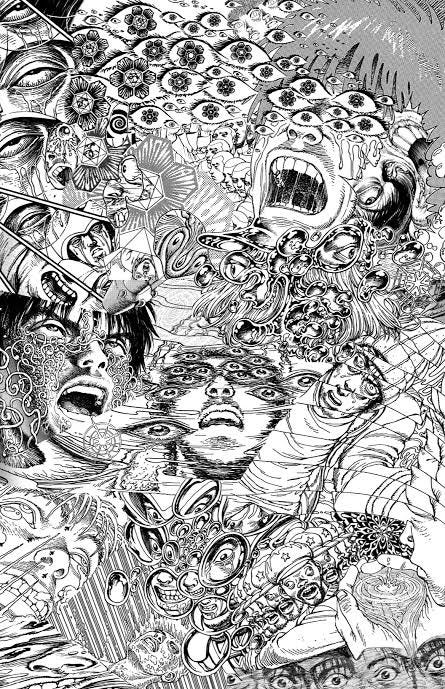
----------
Part 5: Why is this a problem? / conclusion
so yeah, stuff is misstagged, why does this matter?
well, it's just bad for the anime fandom in general
first of all, it's hard to search for avant garde works that are not anthologies, if you were trying to read something like ultra heaven, you could be days googling until finding something like that, mainly since a lot of these mangas are a lot less well known
not only that, but by not tagging these correctly, we are not actively trying the archive of techniques and original ideas that the avant-garde should be, it's giving a wrong impression on what the avant garde actually is.
If you want to write a story yourself, you may be inclined to go see inspirations, and works like these are a fantastic source of inspirations, but again, we're not tagging it correctly, making a lot of people miss the truly ground-breaking stuff
This is the only tag I can recall that has a problem like this, and I think it would be on everyone's best interest to fix it
so, what's your opinion on this? what other works do you think are misstaged?, what are your favourite techniques and tropes?
This term refeers to mainly experimental works, so, fair, let's go to myanimelist, let's go see some examples of this
only 71 results? why?, and all the ratings are actually quite low too, the best rated one only being a 7.6, the lowest out of any category in myanimelist
are these the only avant garde works that there are? is this really it?
I don't think so: Let me explain
Avant garde as I explained earlier, is a term meant to differentiate very experimental works, in this case, experimental mangas/animes, however, what counts as experimental is subjective, it depends on what you have experienced so far, and how far and innovative the thing you're reading is
not only that, but the historical period when the work was created also matters a lot in order to qualify things into this category, I think the highest rated avant-garde manga on myanimelist does a very good job at explaining this, so, let me analyze it, in order to find out what counts as avant garde
-----
Part 1: Jun: Shoutarou no Fantasy World
Jun is a manga created in 1966, that could be considered an anthology, each chapter contains different characters, in different situations, with stories inclosed to those chapters.
What's so interesting about this manga, is the panel structure, in a era when most of the mangas feel very stiff with it's structure, where mangakas aren't really decorating the pages or reusing panels, you have jun, where it tears this concept to the ground, I feel chapter 5 is a very good example of this
most mangas wouldn't have dared to do this, have a initial scene, where something happens, and then that action affects the way the page is designed, to then create dialogue in a way that you cant really distinguish any specific panel, this was unseen, this was a crazy development
not only that, but in following chapters, a lot more techniques were showcased, chapters with no dialogue, abstract imaginery and storytelling, unorthodox panel shapes, it has it all
however, if you read all of that description, and thought "I've already seen all of this before", you would likely be right. This manga was written in 1966, and many of these elements have been implemented into works that are not considered avant-garde, a lot of mangas, do stuff outside the panel realm now, here is an example from Witch Hat Atelier
that element, once considered avant-garde, is now being used commonly on modern mangas
okay, so we've stablished what an old, avant-garde manga looks like, let's now analyze a modern avant-garde manga, and one of my favourites,
----------
Part 2: Yuugai Muzai Gangu
This manga was written in 2019, and while it's still an anthology, it's very different to the last. Here, the avant garde elements are mainly in plot since it showcases ideas that you've probably never read in any manga before, the first chapter is a great example of this
In this chapter, there are a couple of weird inventions being showcased, one of them is a doll that looks like whatever the person will find the most appealing
here is that invention in action
this is the most bizarre element of the manga so far, the most shocking, however, there are many other plots thrown around in the many chapters, all of them could be a whole manga long, and there are in fact mangas that feel like this, so, let's see one of them
--------
Part 3: If you didn't expect me to talk more about shimeji simulation, you dont know me well enough
This is my favourite manga of all time, in fact, my favourite work of all time, be it videogames, mangas, movies, books, etc
Shimeji has it all, the plot feels like a chapter of the previous manga, while it has a panel structure which at times is crazier than in juns
a lot of the plot questions a lot of philosophy and other psychological works, in fact, from time to time it does mention a lot of the books it refereces out loud, works like no longer human, zaratrusta or even the bible
i'm not going to go too in depth, I already made a thread about shimeji, this is the most apparent during chapter 44, were, the manga straight ups ditchs drawing, and turns into a novel for a little while, not only that, but the plot and worldbuilding supports this change (dont actually read the text as it contains spoilers but yeah, it's like that)
the entire later half of shimeji is like that, it throws so many concepts, so many ideas, and so extreme too, like ditching drawing, that has to be the most extreme case i've ever seen of breaking a manga structure, no manga i've read contains anything like that, this is experimental, this is original, this is clearly avant-garde
but if you look in myanimelist, this is not considered avant-garde, and my theory on it, is that this is because it's not an anthology
if you look at all the mangas considered avant-garde, most of them, except with a few exceptions are anthologies, not only that, but a lot of the tropes, like textless chapters, repeat, however, a non-anthology manga like shimeji simulation, with a innovative idea that's the reverse of that avant-garde trope, is not considered one
something that takes the avant garde, and makes it even mroe avant garde, is not avant garde, and I have another work, that is very clearly avant-garde, that is not an anthology, that is not considered avant garde
----------
Part 4: Ultra heaven
Ultra heaven is the purest for of avant garde, as the manga is literally based on the experiences they had with LSD. The story is from time to time told in a way that is not chronological, the plot it's absolutely insane, the art is crazy, and it introduces many new concepts
i'm not going to go in-depth on this one, i'm just showcasing it to support my theory, you should just read it yourself, here is a panel from it so you know i'm not bullshitting
----------
Part 5: Why is this a problem? / conclusion
so yeah, stuff is misstagged, why does this matter?
well, it's just bad for the anime fandom in general
first of all, it's hard to search for avant garde works that are not anthologies, if you were trying to read something like ultra heaven, you could be days googling until finding something like that, mainly since a lot of these mangas are a lot less well known
not only that, but by not tagging these correctly, we are not actively trying the archive of techniques and original ideas that the avant-garde should be, it's giving a wrong impression on what the avant garde actually is.
If you want to write a story yourself, you may be inclined to go see inspirations, and works like these are a fantastic source of inspirations, but again, we're not tagging it correctly, making a lot of people miss the truly ground-breaking stuff
This is the only tag I can recall that has a problem like this, and I think it would be on everyone's best interest to fix it
so, what's your opinion on this? what other works do you think are misstaged?, what are your favourite techniques and tropes?